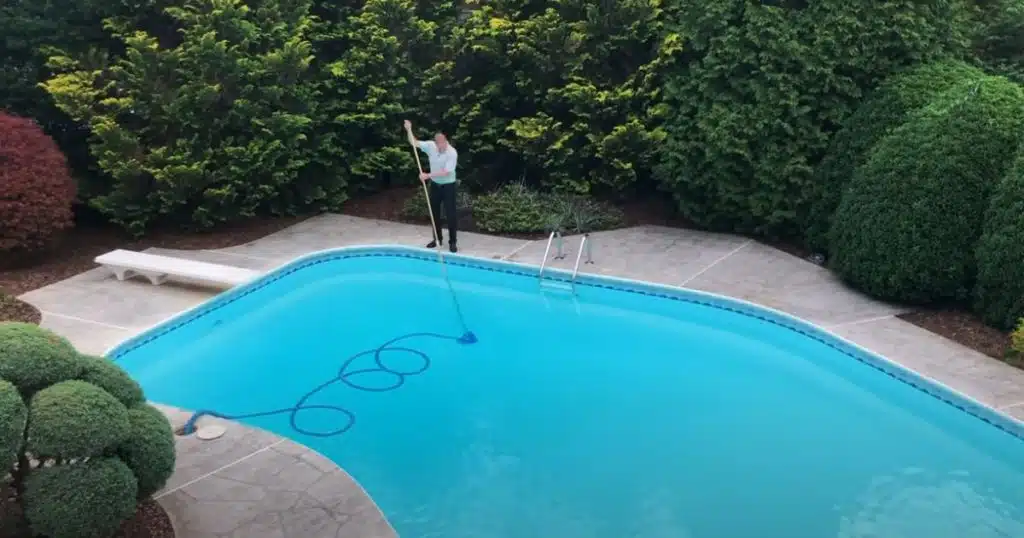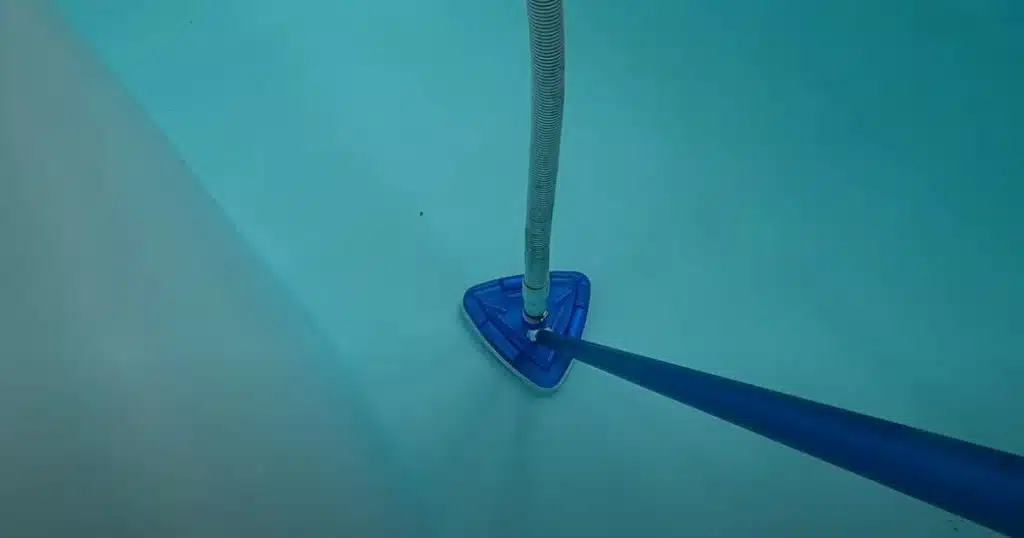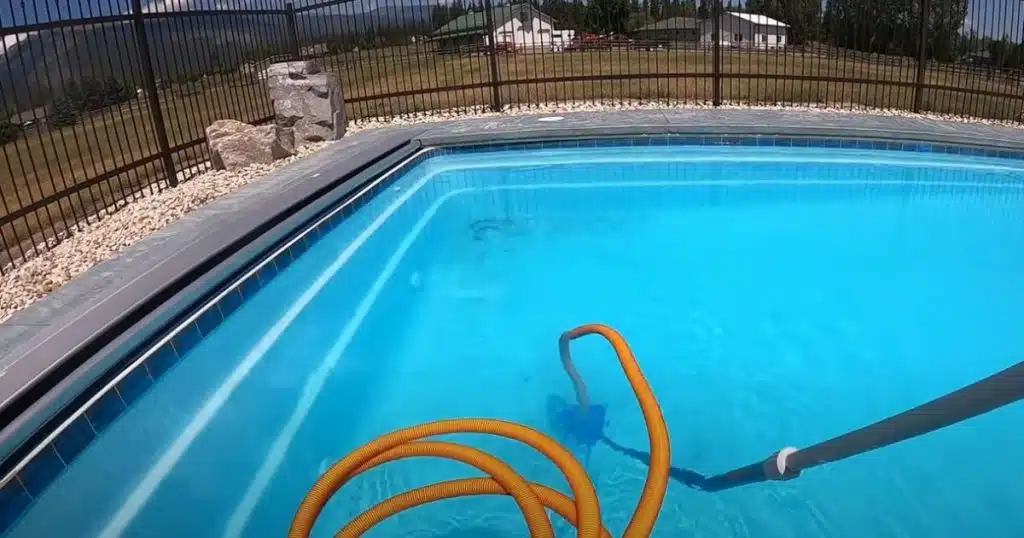As an Amazon Associate I earn from qualifying purchases.
Wondering how often you should vacuum your pool? Consistent vacuuming is crucial for keeping a swimming area clean and safe. How often you need to vacuum depends on factors like the pool’s location, usage, and surrounding environment. If your pool is exposed to a lot of debris, such as leaves, dirt, or pollen, you may need to vacuum it more frequently. This includes vinyl, saltwater, and gunite pools. We’ll also talk about why a clean pool is important. Vacuuming often keeps your pool looking great and ready for a swim anytime.

Why is vacuuming your pool essential?
A luxury swimming pool is a beautiful retreat and keeping it clean is key. Pool vacuuming is crucial for a sparkling, welcoming pool.2 Vacuuming keeps algae at bay and makes the pool look better. It also helps your filter work well and ensures chemicals clean the water effectively.2 Regular vacuuming enhances your pool filtration system. It keeps debris from building up in your pool.
Benefits of a Clean and Well-Maintained Pool
A tidy pool offers a better, healthier swim for your loved ones and guests. With regular vacuuming, your residential pool looks great. It becomes a soothing spot that invites everyone to relax and have fun.
Types of Pool Vacuums
Choosing the right pool vacuum matters a lot for a sparkling pool. There are different types of pool vacuums, ranging from manual to robotic, each with its own unique advantages. So, it’s good to know what each kind offers for your pool’s cleaning.
Manual Pool Vacuums
Manual pool vacuums cost less and need you to do the work. You connect the vacuum to a pole and clean the pool yourself. Even though it can be tiring, vacuuming empowers you with total control over the cleaning process.
Automatic Pool Vacuums
Automatic pool vacuums are a step up in convenience. You can find them as suction-side, pressure-side, or robotic models.4 Suction-side ones use the pool’s pump to work. Pressure-side models, while effective, cost more to run. They need an extra line and pump.Depending on your pool, it can take up to six hours for them to clean.
Robotic Pool Vacuums
Robotic vacuums are top-tier. They clean the floor, walls, and even the tile lines. Thanks to advanced tech, they map the pool for an efficient clean that takes at least two hours. These are ideal for those seeking a smart, hands-free cleaning option.
Frequency Recommendations
Pool Usage Level | Frequency |
High Usage | Daily |
– For pools with heavy use, frequent parties, or lots of swimmers. | |
Moderate Usage | 2-3 Times a Week |
– For pools used regularly but not heavily. | |
Low Usage | Weekly |
– For pools that are used occasionally. | |
After Storms | Immediately After |
– To remove debris and maintain water quality. | |
During Fall | 2-3 Times a Week |
– To manage increased leaf and debris accumulation. | |
Before Pool Parties | Day Before Event |
– Ensures the pool is clean and inviting for guests. |
This chart provides general guidelines for how often you should vacuum your pool based on different usage levels and circumstances.
How Often Should I Vacuum My Pool?
To keep a luxury swimming pool in top shape, you have to vacuum it often. How often you should vacuum your pool varies based on its type. For vinyl pools, doing it weekly helps keep the surface smooth and flexible.
Recommended Vacuuming Frequency for Different Pool Types
Saltwater pools need less care, so they can be vacuumed every two weeks. This cleaning helps stop algae from growing, an essential step. When it comes to Gunite pools, the rough concrete needs weekly vacuuming to fight off dirt and tough algae.
Factors Influencing Vacuuming Needs
Heavy pool use or sudden storms can make your pool dirtier faster. These factors mean you might have to vacuum more often to keep your pool looking good.
Keeping up with regular vacuuming is key to make sure dirt doesn’t build up. It makes your pool a more beautiful place to swim in.

Signs Your Pool Needs Vacuuming
Visible Debris
When you notice leaves, dirt, insects, or other debris accumulating on the pool floor and walls, it indicates the need for vacuuming. Excessive debris can impair water circulation and lead to poor water quality.
Algae Growth
Algae thrive in stagnant water with nutrient-rich debris. Regular vacuuming helps remove organic matter that algae feed on, reducing the risk of algae blooms and keeping the pool water clear and safe for swimming.
Cloudy Water
Cloudiness in the water is often caused by suspended particles like dirt, dust, and algae. Vacuuming helps eliminate these particles, improving water clarity and enhancing overall pool aesthetics.
Seasonal Adjustments
During summer, when pools are used more frequently and warmer temperatures encourage algae growth, it’s essential to increase vacuuming frequency. Try to vacuum your pool weekly to prevent debris buildup and keep the water clear. This frequent cleaning regimen helps combat algae and ensures a clean swimming environment for optimal enjoyment.
In contrast, winter typically sees reduced pool usage and lower temperatures, resulting in slower debris accumulation. Adjust vacuuming frequency to bi-weekly or even monthly sessions during this time to efficiently manage cleanliness without excessive effort. By adapting your vacuuming schedule based on seasonal changes, you can effectively preserve the health and appearance of your pool throughout the year, promoting a longer lifespan for pool equipment and a more enjoyable swimming experience.
Tips for Effective Pool Vacuuming
Keeping a pool clean means using the right vacuuming techniques and being safe. When you clean your pool, focus on getting rid of small debris and dirt. Don’t worry about big stuff. Make sure the vacuum is in the water all the time. Don’t vacuum when people are swimming.

Proper Vacuuming Techniques
Vacuuming a pool well takes a careful approach. First, clear out any dirt from the filters and pumps. Move the vacuum slowly and take breaks to clean the pump strainer. This helps avoid jams.
Safety Considerations
Safety is key when cleaning a pool. Always wait until the water is empty to start. After you’re done, store the vacuum away safely to prevent any mishaps. If your pool has a vinyl lining, use a vacuum with a soft brush. For pools made of concrete or granite, choose a vacuum with wheels for easy gliding.
Maintaining Pool Vacuum Equipment
Taking care of your pool vacuum equipment is important. Keep the vacuum in a safe place after each cleaning to avoid harm. Also, make sure the filter pump is set to “Filter” and check the water’s pH. This keeps the pool’s chemistry in check.
Follow these pool vacuuming tips and best practices to keep your pool sparkling. This will make swimming a joy for you and your friends.
Enhancing Pool Cleanliness with Professional Services
Vacuuming your pool is key, but you might need pros at times. They provide lots of cleaning and care, keeping your pool top-notch. With their skills and tools, they can handle tough spots. This makes your pool look great.
Professional Pool Cleaning Services | Frequency | Benefits |
Filter Cleaning | 3-6 months | Prevents clogs and disruption to cleaning schedule |
Green to Clean Service | As needed | Removes algae and restores pool water clarity |
Acid Wash | Annually | Removes stubborn stains and built-up scale |
Resurfacing | 5-10 years | Renews pool surfaces and extends lifespan |
Mosquito Barrier Treatments | Seasonal | Prevents mosquito breeding and keeps the area safe |
Look out for certain signs for professional pool cleaning. These include weird colored water, bugs, and irritation after swimming.
Also, watch for scale on surfaces and bubbles in water. America’s Swimming Pool Company, a 20-year expert, is a top choice for pool cleaning.
Final Thought
Keeping a luxury swimming pool nice needs regular care, with vacuuming as a big part. It’s key to know how often to clean various pools and use the right techniques. This keeps your pool crystal clear, inviting, and well-maintained. It doesn’t matter if you go manual, automatic, or robotic. What’s important is to clean it often to keep its beauty and use intact.
By vacuuming your pool often, you not only make the water clearer but also use fewer chemicals and make your pool stuff last longer. Making this a top priority means you can have fun swimming with peace and clarity in your own space.
FAQ
Yes, vacuuming frequency typically increases with larger pool sizes. Because of their larger surface area and greater volume of water, larger pools accumulate debris more quickly. Weekly or bi-weekly vacuuming is often necessary for larger pools to maintain cleanliness effectively.
Yes, vacuuming frequency should be adjusted seasonally. In summer, pools see higher usage and warmer temperatures that promote algae growth and debris accumulation. Therefore, weekly vacuuming is usually recommended. In winter, when pools are used less and debris accumulates slower, vacuuming can be reduced to bi-weekly or even monthly sessions.
Higher pool usage introduces more debris, such as dirt, leaves, and sunscreen residues. Pools with frequent swimmers may require more frequent vacuuming, typically on a weekly basis, to maintain cleanliness and water clarity.
While a good filtration system can effectively capture debris, it’s still essential to maintain a regular vacuuming schedule. Vacuuming removes debris settled on the pool floor and walls, preventing algae growth and maintaining overall water quality.
Regular vacuuming enhances water clarity, reduces the need for chemical treatments, prevents algae growth, and extends the life of pool equipment such as filters and pumps. It also provides a cleaner and safer swimming environment.
Amazon and the Amazon logo are trademarks of Amazon.com, Inc, or its affiliates.
Leave a Reply